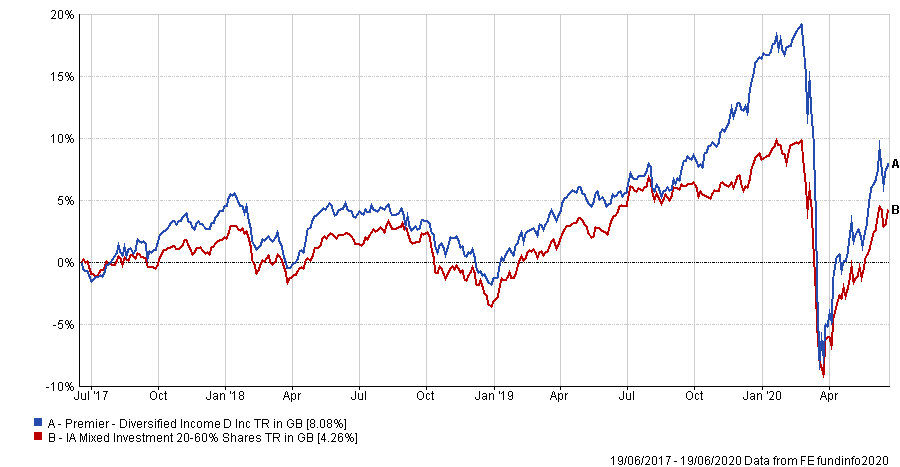Equities and bonds have rallied since the coronavirus sell-off in March, but for investors seeking income, the two asset classes still face headwinds.
Equities have had to grapple with a gloomier economic outlook putting a squeeze on profit margins, as well as regulatory pressure to reduce share buybacks and dividends.
Bond investors, meanwhile, are facing lower yields for the foreseeable future, as monetary policy is likely to remain accommodative to ease the economy out of recession and fund ballooning fiscal deficits. 
In this type of environment, Neil Birrell, chief investment officer at Premier Miton Investors and manager of the Premier Diversified Income fund, explains why he prefers alternative fixed income for his Diversified fund range, over bonds or equities.
Birrell (pictured), who also heads up the Diversified fund range at Premier Miton, said he currently has limited his exposure to bonds across all the Diversified funds.
“We felt like the risk-reward ratio that bonds were affording were relatively unattractive,” he said.
He admitted that bonds have had a good run so far, and that he has been bearish on them for some time, but he did not expect the central banks to intervene to the extent they have done.
“When central banks stepped in, the policy measures from central banks have been quite staggering and that continues to leave us a little bit nervous about bonds at the moment,” said Birrell.
“Even if we like bonds, you’re not going to generate a lot of income from them.”
He said equities were not a good source of income either, and he has reduced the amount of companies with more cyclical exposure.
“Clearly dividends are getting absolutely smashed at the moment, particularly in the UK, Europe and a number of key sectors,” Birrell added.
Instead, the Premier Miton investment chief said that he expects a “massive decrease” in the income paid by companies by way of dividends.
“I don’t think we should be in any doubt that the dividend-paying profile of the stock market has changed probably forever,” he explained.
“In the medium term, dividends will recover, but I think it’s safe to assume that the payout ratio of companies in the market overall will not get back to the level it has been in the past.”
In addition, he noted that equities will be a worse place to obtain dividends, because they “will use this as an excuse just to pay less dividends to shareholders”.
He added: “They’ll be worried about this thing happening again, they’ll wanna keep those balance sheets stronger, and there’ll be less pounds, dollars euros and yen paid out for a very long time.”
This is why alternative sources of income remain attractive in his view.
Alternative fixed income can come in the form of investment companies or trusts, that have income generating assets ranging from music royalties to and niche corporate loans.
Robin Willis, an investment company specialist for Premier’s alternatives portfolio said that risk-adjusted returns “are a lot more attractive” in the alternative space.
He attributed this to the fact that since the global financial crisis, banks have been unable to lend as they previously had due to new regulations and capital requirements, which meant certain industries in niche areas couldn’t borrow from traditional lenders.
“That created an opportunity for niche management teams with expertise to be able to lend to those markets at much more attractive returns,” said Willis.
One investment company he highlighted was London-listed Biopharma Credit– a top holding in the Premier Diversified Income fund – which loans to the life sciences industry.
He said: “These are loans secured on the cash flows of the sales of approved drugs or health products, and they’re diversified across various drugs whether they be drugs for cancer, allergies, sickle cell, kidney disease, etc.
“The team has been around a long time, and have been through a few cycles, and know the area very well. Participants in the industry know them well so they often get the first call when companies are trying to raise capital.”
Willis argued that this sort of income is not going to be sensitive to the broader economic climate, and that it can be very defensive.
The investment company is yielding a “really attractive” 7 per cent yield.
Another investment company Willis highlighted was Hipgnosis Songs Fund, which sources income from music royalties through buying a catalogue of pop songs.
Willis said he participated in the initial offering because he believes the capital value will considerably grow over time.
He said: “It is also a play on streaming, which is becoming more and more prevalent, and it's something that's not as sensitive to the broader economic environment; that can perform quite well when other things aren't.
“As management will tell you, people listen to music when they are celebrating or commiserating.”
Willis said it has seen a pick-up in subscriptions across all entertainment platforms over the past few months.
Birell said one of the crucial aspects investors should consider when looking at alternative fixed income is the surety of income. With the Bank of England base rate set at 0.1 per cent, he said, “there’s clearly a surety of income in the bond market, but at a very low level.”
Performance of fund vs sector since launch

Source: FE Analytics
Since launch in June 2017, the £30.6m Premier Diversified Income fund has returned 8.57 per cent versus the IA Mixed Investment 20-60% Shares sector average return of 4.26 per cent. It currently yields 4.74 per cent and has an ongoing charges figure (OCF) of 0.78 per cent.




